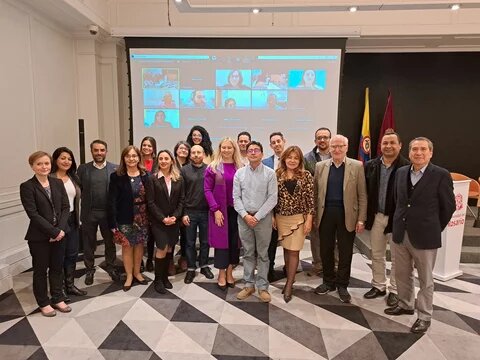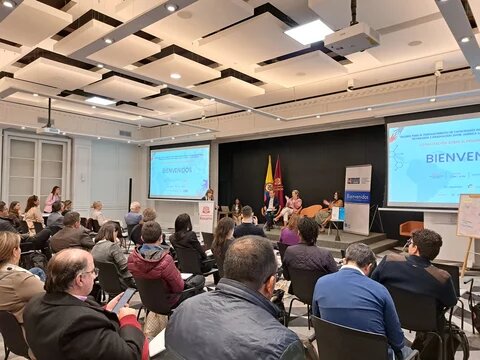The EU-LAC Foundation and its partner, the Agencia Uruguaya de Cooperación Internacional (AUCI)/Coordinadora de la Red LAC-NCP co-organised the "Workshops for institutional capacity building in science, technology and innovation cooperation between Latin America and the Caribbean and the European Union: Focus on the Andean Region", which took place in Bogota, Colombia, on 22, 23 and 24 February. The workshops were implemented with the support of the Colombian Ministry of Science, Technology, and Innovation (Minciencias), the Colombian Association of Universities (ASCUN) and the EURAXESS Office in Colombia.
The aim of these information dissemination and training days was to increase the level of participation, as well as to broaden knowledge and take advantage of the opportunities offered within the framework of the Horizon Europe Programme to strengthen scientific cooperation between scientific institutions and researchers from the European Union, Latin America, and the Caribbean.
The participation rate was very high, bringing together approximately 650 attendees both in person and virtually over the three days. In the first workshop, attendees participated in a dialogue on the Joint Initiative for Research and Innovation (JIRI) that took place at the Ministry of Science, Technology and Innovation in hybrid form.
The second workshop, hosted by the Universidad del Rosario in Bogota, was dedicated to the training of the National Contact Points (NCP) of the Horizon Europe Programme of the Andean countries (Colombia, Ecuador, Peru, Bolivia). Among the various activities that took place, it is worth highlighting the informal networking space that was brought between European and Latin American and Caribbean NCPs, in which they were able to exchange experiences on the implementation of the functions of an NCP and share contacts among attendees.
The last workshop focused on training on the Horizon Europe Programme for researchers, university managers, representatives of university associations and NCPs, and took place again at the University of Rosario. Several presentations were given on different elements of the Horizon Europe Programme and a group exercise was carried out to apply for a specific call.
The workshops were attended by various international and national speakers from Colombia, such as Gilles Bertrand, Ambassador of the European Union in Colombia; Daniel Kiapes, representative of the European Commission; Claudia Romano from the LAC NCP-AUCI Network; Yesenia Olaya Requene, Vice-President of the European Commission; Claudia Romano from the LAC NCP-AUCI Network; and Yesenia Olaya Requene, Vice-President of the LAC NCP-AUCI Network; Yesenia Olaya Requene, Vice-Minister of Talent and Social Appropriation of Knowledge; Viktoria Bodranova, from Euraxess LAC; Paula Andrea Venao, Chancellor President of the Universidad del Rosario; Óscar Domínguez from ASCUN; Anna Barrera Vivero, from the EU-LAC Foundation and Adrián Bonilla, from the EU-LAC Foundation.
Finally, it is worth noting that throughout the workshops, the guests were able to listen to high-quality reflections, such as that of Mr Gilles Bertrand:
The very interest of students in Erasmus grants and the possibility of exchanges with the European Union are a very clear expression of the ties that exist to cooperate and make research a shared process. But we can do much more, there is a lot of potential in the work we do with Colombia, in research and innovation, and in the work towards remote regions, which in turn are the hardest hit by the conflict. The EU is strongly committed to having a strong presence in remote areas of the country.
Vice-Minister Olaya indicated that:
For Colombia it is a priority to bring science to the territories affected by war and armed conflict and to make science a reference for life for all the country's populations.
And that our Executive Director, Dr Adrián Bonilla mentioned:
One of the crucial spaces of civil society is science, given the autonomy enjoyed by organisations that do research (...). These workshops involve three days of exchanges of experiences and information between actors and organisations that are related in their mission.

